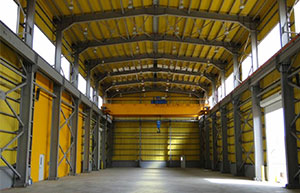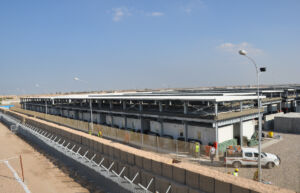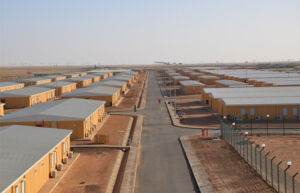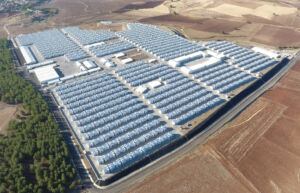World Newspaper Webinar – Sleeping giant in the fight against climate crisis: Construction industry
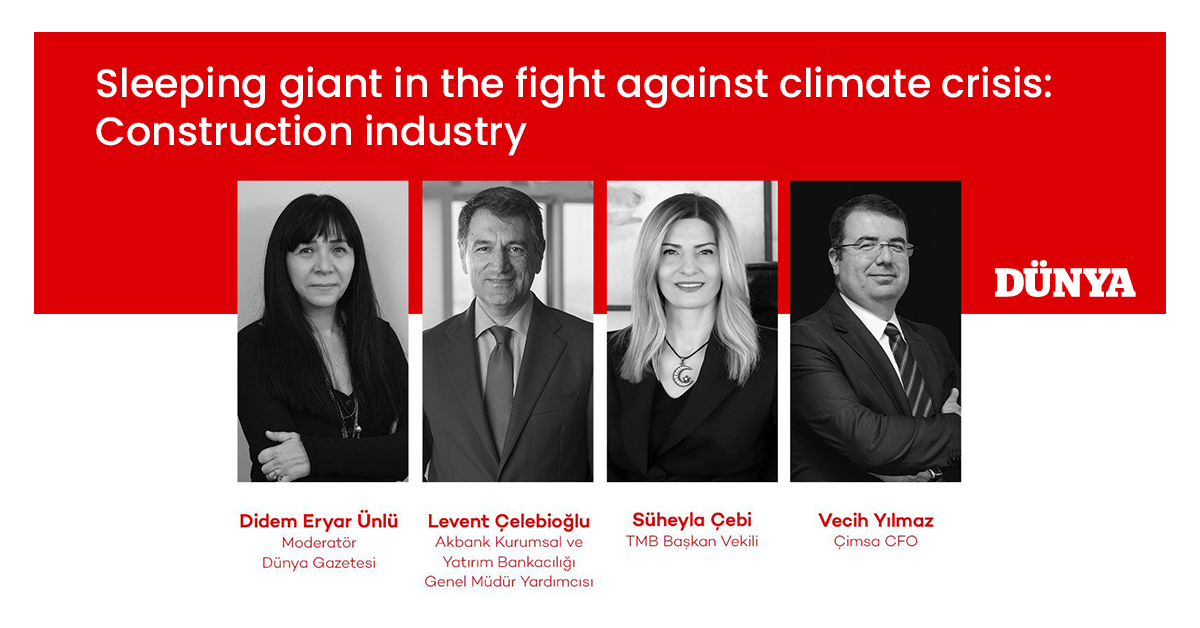
The contracting industry represents more than 50 percent of global wealth and causes 39 percent of carbon emissions. Buildings cause more than 30 percent of global emissions. 7 percent of global carbon emissions come from the cement sector. This rate goes even higher when construction is included. According to industry stakeholders, the green transformation is a matter of great urgency.
The European Union is developing measures to minimize the Union’s carbon footprint within the framework of the new growth model known as the Green Deal. The goals of reducing greenhouse gas emissions by 55 percent by 2030 and being carbon neutral in 2050 have been set. The European Union is planning to put an end to the fossil fuel-based economic model by imposing these practices on the countries with which the EU has commercial relations.
Green Deal brings a revolutionary transformation in every sector such as investing in environmentally friendly technologies, supporting innovation in the industry, decarbonization of the energy sector, transitioning to 100% renewable energy sources and making buildings energy efficient.
This process should be considered as an opportunity rather than a threat for Turkey. However, for Turkey to benefit from this transformation, the transition to a low carbon economy model needs to be accelerated. At this point, “financing the green transformation for the transition to a low-carbon economy” is of utmost importance.
The opportunities and threats that green transformation will bring in the construction industry were discussed in the first episode of the webinar series “Green Deal in Sectors” which is held in cooperation with Dünya Newspaper and Akbank.
Deputy Chairman of the Turkish Contractors Association (TMB), Süheyla Çebi Karahan, Akbank Corporate and Investment Banking Deputy General Manager Levent Çelebioğlu, and Çimsa CFO Vecih Yılmaz attended the webinar. It was moderated by Dünya Newspaper Coordinator Didem Eryar Ünlü. Here are the highlights of the first episode:
Çimsa CFO Vecih Yılmaz: The competition in cement will be determined by emission level of EU
“The EU has set game-changer targets. We expect a transformation in many sectors in the upcoming period. Cement and construction are among them. 7 percent of global carbon emissions come from the cement industry. This rate goes even higher when construction is included. The carbon border tax will be applied, but the details are not clear yet. We consider the next 2-3 years as crucial in this sense. Considering the determined levels, it can be overwhelming for Turkey, which may result in losing competitive power, or if the balance here develops in our favor, it may be possible for Turkey to become a production base of entire Europe in the field of cement and other construction materials. We do not know our carbon level yet. According to the intelligence we’ve been receiving, our competitors in Europe are expanding their lobbying activities in order to bring their quotas to the fore.
The important issue here for achieving a border carbon level that may be in favor of Turkey is that Turkey should use the full power of the industrialists as well as the public in order to carry out lobbying activities effectively. This transformation will be very costly. Serious investment is needed. The EU is talking about an incentive of 1 trillion Euros. However, if we can correctly position ourselves as the private sector and the public sector, we anticipate that Turkey will receive a significant share in terms of both financing resources and incentives. Cement is the most consumed material among construction materials.
Concrete is the most used commodity in the world after water. At the point where urbanization has reached today, we cannot solve the housing problem without cement yet. Therefore, it is necessary to focus on low-carbon innovative products while producing cement which means more R&D is needed. Therefore, the tight cooperation between universities and industrialists is important. Meanwhile, it will be important to shift the fuels used in cement production to eco-friendly alternatives.
Another issue is financing in carbon-intensive sectors. Cement, iron, and steel are treated as an ‘ogre’ and punished. If this trend continues, the transformation of these sectors will become more difficult.
90% of our R&D budget is focused on sustainability
“Environmental impact is a criterion for accessing many sources of finance. This is not only happening on the financing side, but also on the investor side. They question the carbon we emit and what we do to manage it in a disciplined way. As Çimsa, we are a company engaged in production in Turkey, but we bought the Buñol Factory in Spain in July this year. We are currently producing in Europe being subjected to the carbon regime. Carbon costs, which were 30 Euros at the beginning of this year, have increased to 75 Euros.
Our cement costs have not reached that point. We have to pay 1.5 times our production cost as a carbon tax. If the carbon border tax applies at similar levels against these devastating effects, many sectors will no longer have the opportunity to export. We have been reporting our carbon emissions since 2010. In 2016, we became the industrial company that published Turkey’s first integrated industry report. 90% of our R&D budget is spent on sustainability issues. We are trying to invest in low-carbon products, technologies that reduce the use of fossil fuels and generate electricity from waste heat. If the world is to be carbon zero, it will not be with current technologies, but with emerging carbon capture technology. As a company, we are evaluating opportunities for cooperation with companies that put effort into this issue.”
Süheyla Çebi Karahan, Deputy Chairwoman of the Turkish Contractors Association (TMB): Green loans should be extended extended throughout the industry
“As the Turkish Contractors Association, we closely followed the COP26 held in Glasgow this year. The United Nations defined the contracting industry as “an economic powerhouse that represents more than 50 percent of global wealth, but a sleeping giant when it comes to the fight against climate change”. The Turkish contracting industry has become a global brand and has a business volume of over 400 billion dollars. In order not to lose our competitiveness in the new world conditions, we need to accelerate the adaptation process to the Green Deal. In the projects that our members follow closely, we are faced with issues such as digitalization, sustainability, green building and circular economy. Companies doing business in the international arena have been trying to adapt with in-house working groups. Nevertheless this awareness cannot be spread to the rest of the country in this way. As the contracting service sector, we provide employment abroad, exports construction materials produced in Turkey and earns foreign currency. Therefore, it is very important for our stakeholders to adapt to this process as soon as possible; Otherwise, our country will lose. But this is not something to be done on a voluntary basis. The legal basis should be prepared by the public and then brought to the agenda gradually.”
Now it is time to get down to business
“The International Finance Corporation (IFC) will realize investment projects valued at 25 trillion dollar in the next 10 years. These projects, which have been suspended during the pandemic process, will start quickly. If we want to get a share from these projects, to play a role in new world order and to protect our branded contracting sector, steps must be taken as soon as possible. According to research carried out by the World Bank, 7 out of 10 people of the world’s population will live in cities in the next 10 years. This will create additional needs for infrastructure, roads, bridges and housing investments.
We work hand in hand with cement, logistics, aluminum and energy sectors. We have been carrying out awareness studies on Green Deal and Carbon Border Adjustment Mechanism (CBAM); but these are no longer enough. Now it is time to get down to business. Public institutions should gradually include these issues in the tender specifications. Businesses must first calculate how much carbon they emit while producing a product or doing a job. It’s called ISO 14064 – Greenhouse Gas Verification Statement. There are few companies in Turkey that have already received this certificate. Another pillar of the business is logistics. We buy many materials such as dye, sheet, iron, coating. It is necessary to reveal how much carbon footprint is emittim in the production process of these materials.”
50 percent of global wealth 39 percent of carbon emissions
“After becoming a party to the Paris Agreement, the green loans that will come should be managed very well andextended throughout the industry. The machinery and equipment should be eco-friendly. If we fail to make this change, tax on materials will be applied. A gradual transition has already begun in Europe. While ISO 14064 certificate is required today, they will probably request a zero-carbon certificate in 3 years. The contracting service sector is responsible for 39 percent of carbon emissions. According to the United Nations, contracting service sector represents 50 percent of the global economy and wealth. Therefore, we think that the contracting service sector should be addressed first. Sustainability is defined as ‘the use of environmental values and natural resources by considering the rights and benefits of present and future generations’. Sustainability is an environmentalist worldview that aims at equitable social and economic development. As the Turkish Contractors Association, we support the process and want to be a part of it.”
Deputy General Manager of Akbank Corporate and Investment Banking, Levent Çelebioğlu: We have committed sustainable loan facilities totalling 200 billion Turkish Lira until 2030
Issues such as climate change, the unstoppable increase in the rate of natural resource consumption, the increasing pollution in our water resources and plastic pollution show that we cannot continue with the current economic models and a transformation is a obligation. Significant steps regarding this transformation process were taken in Turkey. One of the things that I liked very much is the new name of our ministry: The Ministry of Environment, Urbanization and Climate Change. This is important for expressing intent.The Central Bank of Turkey has decided to establish a Green Economy and Climate Change Department within its organizational structure. The Ministry of Environment, Urbanization and Climate Change announced its carbon neutral target in 2053 and started to coordinate related studies. CMB prepared the draft guide on green borrowing and green lease certificates. The Ministry of Commerce started to prepare the Green Deal action plan and established sub-working groups. The Ministry of Treasury and Finance has started to prepare a “Sustainable Finance Framework Document”. All these efforts show that awareness will increase rapidly. The financial sector also plays an important role here.
Akbank is ready to be a part of this journey. At Akbank, we have identified 4 focal points for sustainability: Sustainable finance to support a sustainable economy; ecosystem management to improve the financial health of companies; climate change target to reduce emissions in operations and portfolios and without a doubt, people and society. We have committed sustainable loan facilities totalling 200 billion Turkish Lira until 2030. Awareness about this is rising. Many of our depositors want their money to be used in more sustainable projects.”
90% of our foreign debt is based on sustainability
“We have set the target of not only financing, bur also a sustainable investment fund totalling 15 billion Turkish Lira, We have put sustainability on the agenda on both the active and passive sides of our balance sheet. In addition, we are trying to make our own funding sources on the passive side of our balance sheet based on sustainable finance. Thus, we promised that we would make 30 percent of the non-deposit financing that we borrowed from foreign markets in the form of sustainable financing by the end of 2021. As we have come to the end of the year, we have surpessed this target as 40 percent. Our goal is being carbon neutral in our operations by the end of 2025. We have set a target to reduce the impact of our portfolio on climate change by 2030. It doesn’t just end with us. All of our stakeholders should support this process. The financial sector will be the propulsive force of the transformation. In order to establish the correct financing models, companies need to measure their own carbon emissions correctly. The carbon emission will be a very important issue for our companies exporting to EU countries. Investments have started in this area. We need to support these investment plans with the correct financing models. We expect the loan volume, which we call Green Loan, to increase. We have created our sustainable finance framework according to the rules set by international standards.
Therefore, from this point on, our products are ready for issues such as energy efficiency, green buildings, sustainable water, and wastewater management, financing renewable energy investments, sustainable management of natural resources, and green transportation. As Akbank, we have made 90 percent of our foreign borrowing this year on a sustainable theme. We made $1.4 billion of our syndications completely sustainable. We have always provided this sustainable financing from the European Development Bank to combat COVID-19, support women entrepreneurs, and support provinces affected by the refugee influx. We have brought a total of over $2 billion in sustainability-focused resources to our country.”
Companies do not take quick action
“Cement is among the biggest reason for carbon emission. Iron and steel, fertilizer, aluminum, and electricity can be included in this group. Companies see the incoming threat. However, they slow down on ‘taking quick action”, reducing our carbon footprint, developing a strategy, and starting the journey towards becoming carbon neutral. As Akbank, we took out the roof SPP investment loan for corporate companies. We implemented the Green Foreign Trade Package, breaking new ground in Turkey. We offered a more advantageous application to our exporting companies that want to make the green transformation. In addition, last year, we signed Turkey’s largest sustainability loan project totaling 650 million Euros. As Akbank, we financed 33% of the project. We launched blue financing products for tourism, port, and maritime transportation companies, which are sectors that aim to reduce their environmental footprint. In the upcoming period, we will talk about green deposits as well as loans. In 2020, 520 billion dollars of sustainable-themed bonds were issued in the world. It increased by 43% and reached 740 billion dollars in October 2021. It could reach 1 trillion by the end of the year.”
https://www.dunya.com/ekonomi/iklim-krizi-ile-mucadelede-uyuyan-dev-insaat-sektoru-haberi-644601
